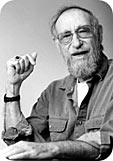| home | our mission | contact us | issue archive |

Apr 2001 / communities :: email this story to a friend

Tending to a Writing Community
By Kent Shaw
Don Finkel Of the many stories Don Finkel has to tell about being in St. Louis, my favorite is how he got married. He and Constance were on the train from Iowa City to Mexico, where they were going to live until the money ran out. St. Louis was not really a place on the map for either one of them. Don, originally from New York City, had found the Iowa Writers' Workshop after three universities and a frustrating position instructing freshman comp at University of Illinois.
The train pulled into Union Station, and the two ran off, down Market and into the Civil Courts building for a quick Justice of the Peace wedding. Next is the image of two giddy newlyweds walking back down Market past the flophouses and little bars. Their layover was only two hours. After which they were going straight to Mexico, footloose and fancy free.
St. Louis and Washington University came much later. In fact, it came when neither Don nor his wife Constance was expecting it. They were teaching courses at University of Iowa when Jarvis Thurston approached them about coming to Washington University to teach. Thurston and his wife Mona Van Duyn were looking for a way to build a writers' program at Washington University. The idea was very new in the US. In fact, there were very few other programs outside of the one at University of Iowa. Thurston wanted to know if Don and Constance were interested in helping him create one.
A few years later, both were in St. Louis teaching courses at Washington University. This still was not a formal writing program. They were teaching graduate courses, and sometimes the courses they taught were creative writing courses. However, the university was not actively searching for young writers to come study there. Instead, the young writers were finding Washington University because Don, Constance and other writers were there, and they wanted to learn from them.
The university eventually recognized this influx of writers. In a way, the writers' program created itself with presence and momentum. But the real work was trying to corral the writers that came and making them into a community.
For thirty years, Don and Constance taught with the writers' program at Washington University. Over that time, they touched the lives of many writers, some who have continued to live here in St. Louis. David Clewell, the head of the English Department at Webster University and author of several books of poetry, studied under Don Finkel. Eugene Redmond, head of many East St. Louis writers' groups studied under Don Finkel. Many other St. Louis poets have had courses with Don at Washington University or other local universities where he is invited to visit and teach.
Brian Cochran received his Master's of Fine Arts from Washington University in the mid-'80s. "Most of us ended up spending two or three years just living and breathing poetry, and doing it together...calling each other at midnight saying, 'I've just got to read you this!,' talking incessantly, meeting for workshops before the workshops." Don has stressed many times that a writers' group is not made by classes where writers come to be taught. A writers' program is made from a community of writers who look to one another for support. It is a unique chance to share thoughts and inspiration with others.
Don took the program outside of the classroom with weekly touch football matches in Forest Park. It was the poets versus the fiction writers. (Normally, the poets would win, of course, with a little creative scoring.) Poetry was meant to be fun. It was something to be experienced and enjoyed. This was from a poet who is known for doing extensive research on his topics. Don reads and studies, and he also lives. He is meticulous with details, and he is playful with his language.
Ultimately, Don is enthusiastic about poetry, and he wants the poets he teaches to feel that enthusiasm. Lisa Pepper had Don in a class last year at Webster University. After teaching in St. Louis since 1960, he had quite the reputation preceding him. Lisa says that many poets in the class were nervous to take him. They weren't sure what it would be like. Don quickly put everyone at ease. When it comes to poems, he's astute and has a way of addressing a poet's line breaks or word usage that leaves little room for debate. But when it comes to telling a story or reading his favorite lines from another poet's work, he is, to use his own words, "a real sweetie."
It's because he cares. Recently, I was walking home with Don after having a beer. He told me about speaking with Marvin Bell, a poet retiring from University of Iowa. Marvin said the thing that pleased him most was getting to teach. "I always loved my students," he said. It was enough then to see the spark in Don's eye when he told me this. And his glowing smile.
Church and State | Games | Expatriates | Communities | From the Source
It's All Happening | Young Minds | The Ordinary Eye | Elsewhere
Sights and Sounds | Media Shoegaze | A Day's Work | From the Editor
© 2001 The Commonspace

